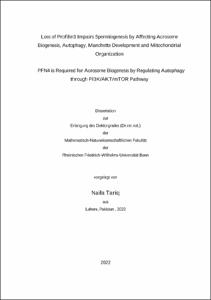Loss of Profilin3 Impairs Spermiogenesis by Affecting Acrosome Biogenesis, Autophagy, Manchette Development and Mitochondrial Organization
PFN4 is Required for Acrosome Biogenesis by Regulating Autophagy through PI3K/AKT/mTOR Pathway

Loss of Profilin3 Impairs Spermiogenesis by Affecting Acrosome Biogenesis, Autophagy, Manchette Development and Mitochondrial Organization
PFN4 is Required for Acrosome Biogenesis by Regulating Autophagy through PI3K/AKT/mTOR Pathway
PFN4 is Required for Acrosome Biogenesis by Regulating Autophagy through PI3K/AKT/mTOR Pathway

| dc.contributor.advisor | Schorle, Hubert | |
| dc.contributor.author | Tariq, Naila | |
| dc.date.accessioned | 2022-12-02T12:35:07Z | |
| dc.date.available | 2022-12-02T12:35:07Z | |
| dc.date.issued | 02.12.2022 | |
| dc.identifier.uri | https://hdl.handle.net/20.500.11811/10495 | |
| dc.description.abstract | Loss of Profilin3 Impairs Spermiogenesis by Affecting Acrosome Biogenesis, Autophagy, Manchette Development and Mitochondrial Organization
Profilins (PFNs) are key regulatory proteins for the actin polymerization in cells and are encoded in mouse and humans by four Pfn genes. PFNs are involved in cell mobility, cell growth, neurogenesis, and metastasis of tumor cells. The testes-specific Pfn3 is localized in the acroplaxome–manchette complex of developing spermatozoa. I demonstrate that PFN3 further localizes in the Golgi complex and proacrosomal vesicles during spermiogenesis, suggesting a role in vesicle transport for acrosome formation. Using CRISPR/Cas9 genome editing, I generated mice deficient for Pfn3. Pfn3-/- males are sub-fertile, displaying a type II globozoospermia. I revealed that Pfn3-/- sperm display abnormal manchette development leading to an amorphous sperm head shape. Additionally, Pfn3-/- sperm showed reduced sperm motility resulting from flagellum deformities. I show that acrosome biogenesis is impaired starting from the Golgi phase, and mature sperm seems to suffer from a cytoplasm removal defect. An RNA-seq analysis revealed an upregulation of Trim27 and downregulation of Atg2a. As a consequence, mTOR was activated and AMPK was suppressed, resulting in the inhibition of autophagy. This dysregulation of AMPK/mTOR affected the autophagic flux, which is hallmarked by LC3B accumulation and increased SQSTM1 protein levels. Autophagy is involved in proacrosomal vesicle fusion and transport to form the acrosome. I conclude that this disruption leads to the observed malformation of the acrosome. TRIM27 is associated with PFN3 as determined by co-immunoprecipitation from testis extracts. Further, actin-related protein ARPM1 was absent in the nuclear fraction of Pfn3-/- testes and sperm. This suggests that lack of PFN3 leads to destabilization of the PFN3–ARPM1 complex, resulting in the degradation of ARPM1. Interestingly, in the Pfn3-/- testes, I detected increased protein levels of essential actin regulatory proteins, cofilin-1 (CFL1), cofilin-2 (CFL2), and actin depolymerizing factor (ADF). Taken together, our results reveal the importance for PFN3 in male fertility and implicate this protein as a candidate for male factor infertility in humans. | en |
| dc.description.abstract | PFN4 is Required for Acrosome Biogenesis by Regulating Autophagy through PI3K/AKT/mTOR Pathway
Profilin4 (Pfn4) is a member of profilin gene family and during spermiogenesis localizes to the acrosome-acroplaxome-manchette complex. Yet, the role of PFN4 in male fertility is not fully understood. We generated PFN4-deficient mice and observed structural defects in manchette formation resulting in amorphous heads, and flagellar defects. Further, sperm quantity, and motility were reduced. Interestingly, we observed manchette defects by using HOOK1 and ARL3 antibodies in PFN4-deficient mice. Disrupted cis- and trans-Golgi networks and aberrant production of proacrosomal vesicles resulting in impaired acrosome biogenesis. Acrosome formation requires the contribution of autophagic machinery during proacrosomal vesicle fusion and transportation. Proteomic analysis showed, that proteins ARF3, SPECC1L and FKBP1, involved in Golgi membrane trafficking and the PI3K/AKT pathway, to be higher abundant in testes of PFN4-deficient mice. In Pfn4-/- mice, protein levels of PI3K, AKT, and mTOR were elevated while, AMPK level was reduced consistent with an inhibition of autophagy. This seems to result in blockage of autophagic flux, by the accumulation of LC3I/II and SQSTM1 in Pfn4-/- mice. In addition, IVF revealed that Pfn4-/- sperms were capable of fertilizing only zona free oocytes. Our results depict for the first time that PFN4 is essential for manchette development, protein transport affecting formation of sperm head, flagella, and acrosome biogenesis. | en |
| dc.language.iso | eng | |
| dc.rights | In Copyright | |
| dc.rights.uri | http://rightsstatements.org/vocab/InC/1.0/ | |
| dc.subject.ddc | 500 Naturwissenschaften | |
| dc.title | Loss of Profilin3 Impairs Spermiogenesis by Affecting Acrosome Biogenesis, Autophagy, Manchette Development and Mitochondrial Organization PFN4 is Required for Acrosome Biogenesis by Regulating Autophagy through PI3K/AKT/mTOR Pathway | |
| dc.type | Dissertation oder Habilitation | |
| dc.publisher.name | Universitäts- und Landesbibliothek Bonn | |
| dc.publisher.location | Bonn | |
| dc.rights.accessRights | openAccess | |
| dc.identifier.urn | https://nbn-resolving.org/urn:nbn:de:hbz:5-68532 | |
| dc.relation.doi | https://doi.org/10.3389/fcell.2021.749559 | |
| dc.relation.doi | https://doi.org/10.1242/dev.200499 | |
| ulbbn.pubtype | Erstveröffentlichung | |
| ulbbn.birthname | Umer | |
| ulbbnediss.affiliation.name | Rheinische Friedrich-Wilhelms-Universität Bonn | |
| ulbbnediss.affiliation.location | Bonn | |
| ulbbnediss.thesis.level | Dissertation | |
| ulbbnediss.dissID | 6853 | |
| ulbbnediss.date.accepted | 26.10.2022 | |
| ulbbnediss.institute | Medizinische Fakultät / Institute : Institut für Pathologie | |
| ulbbnediss.fakultaet | Mathematisch-Naturwissenschaftliche Fakultät | |
| dc.contributor.coReferee | Witke, Walter | |
| ulbbnediss.contributor.orcid | https://orcid.org/0000-0002-1325-5964 | |
| ulbbnediss.contributor.gnd | 1284522342 |
Dateien zu dieser Ressource
Das Dokument erscheint in:
-
E-Dissertationen (4118)




